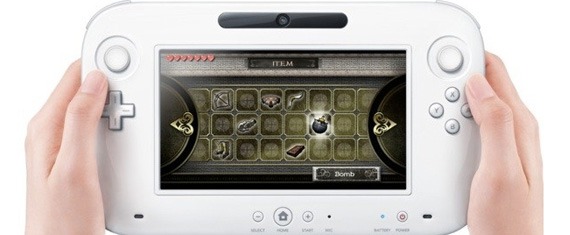 Nintendo took the wraps off its Wii U console yesterday with more than a few “what?!” comments uttered quietly by the crowd. There were also more than a handful of “holy s**t!” exclamations, which has come to be expected from any Nintendo E3 press conference. Beyond those knee-jerk responses, a few longer-term questions remain not just in terms of gamers’ potential satisfaction, but in terms of their likelihood of buying the Wii U. Below are three things we’ve debated since the Wii U’s official unveiling that may hurt Nintendo’s chances for success. Feel free to comment, react and respond at the bottom to let us know your thoughts as well.
Nintendo took the wraps off its Wii U console yesterday with more than a few “what?!” comments uttered quietly by the crowd. There were also more than a handful of “holy s**t!” exclamations, which has come to be expected from any Nintendo E3 press conference. Beyond those knee-jerk responses, a few longer-term questions remain not just in terms of gamers’ potential satisfaction, but in terms of their likelihood of buying the Wii U. Below are three things we’ve debated since the Wii U’s official unveiling that may hurt Nintendo’s chances for success. Feel free to comment, react and respond at the bottom to let us know your thoughts as well.
The Name. When Nintendo unveiled the original Wii, they did so only after announcing the console’s name the week prior. The company’s logic? Let the public, particularly gamers, get over the bizarre name, work the jokes out of their systems and mentally prepare themselves to focus on the console’s capabilities rather than its moniker. Millions of Wii sales later, Nintendo’s strategy proved sound. But with the Wii U, the company may have misfired. There will still be plenty of jokes to work through (“Pii U,” for instance), but those will pass. Where the miss lies is in the lack of any elegance to the name. I understand the “tech bubble”-type logic behind the name, but that bubble burst long ago. “Wii” at least rolled off the tongue. But try these on for size: “I was playing my Wii U last night, and…” “I was planning to buy a Wii U for my kid, but first I want to…” “Did you see Rockstar debuted the new trailer for GTA on the Wii U last night during the…” Those sentences work, but the name just seems forced. My bet’s on people, casual and hardcore gamer alike, just calling the system “Wii” and moving on with their lives.
The Price. Nintendo hasn’t announced it yet, so don’t freak out. But by not talking about the Wii U price, Nintendo’s obviously still working through internal debates about just how much they need to take it in the shorts. All consoles are subsidized at launch with the goal of making it up over the long haul and via software margins, but the R&D that’s gone into the Wii U could be Nintendo’s undoing. Not only are gamers going to have to buy a console, which by Nintendo’s account will have all the graphical bells and whistles of the Xbox 360 and PS3, but they’ll also have to buy what amounts to an uber-interactive tablet computer, which isn’t exactly a cheap proposition. Nintendo will have to either take big short-term hardware losses to sell this thing like hotcakes or increase its cost to entry for Joe Q Public. Both of those represents a roll of the dice, and either one could really hurt Nintendo’s chances of a successful launch. Who will “crap out” in that equation, Nintendo or the gaming public?

The Mobile Gaming and Tablet Scene. See the comment above about the Wii U controller being a tricked-out tablet. Tablets, be they Android or iOS based, took the electronics world by storm at CES this year, and that trend hasn’t shown any sign of slowing down. As mobile games become increasingly prevalent, the prospects of tablets turning into “mini consoles” grow exponentially, and that could hinder the Wii U’s chances. For context, look at Nintendo’s DS family. Yes, it’s the best-selling platform of all time, but the latest member of that handheld family is struggling to find a foothold. The 3DS has a strong 2011 game lineup in store, and sales may even pickup in Q3 and Q4. But the simple fact that it’s not taken off like hotcakes gives reason for pause with the Wii U. If smartphones are eating into the best-selling system of all time, what will that trend plus the growing landscape of tablets do for sales of the tablet-like Wii U controller? And that’s not even taking into account the multiple functions of tablets in addition to gaming?
Now, with those three things said, the lines at E3 2011 for Nintendo’s booth are certifiably insane, as was the case when the Wii was launched. That definitely swings the pendulum in Nintendo’s favor, at least where initial buzz is concerned. But the Wii U doesn’t launch until 2012, which not only gives Microsoft and Sony time to conjure up new-console announcements for E3 2012, but also gives the mobile-gaming industry time to advance its own agenda and capabilities. Those don’t exactly align with Nintendo’s hopes for the Wii successor. Twelve to 17 months is an eternity in the development space, and that’s probably what we’ve got until the Wii U launches worldwide. What happens during that span will only reduce Nintendo’s chances for success, but depending on the company’s aggression with the Wii U price point, Nintendo could regain control of its destiny.
